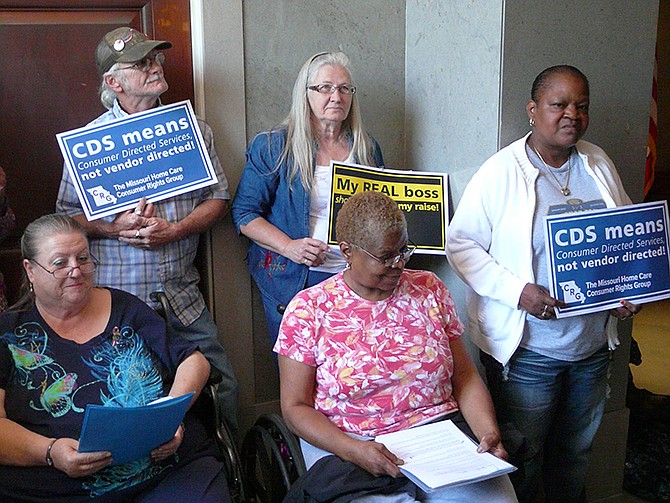When the Legislature's Joint Committee on Administrative Rules meets this morning, they should approve a proposed rule affecting home health care wages.
That was the message Monday afternoon from about a dozen attendants and clients, delivered to reporters during a 16-minute news conference in a small alcove at the corner of a Capitol hallway.
The rule, proposed by the state's Health and Senior Services department, would allow clients in the "consumer-directed services program" to set their attendants' pay within the $8.50 to $10.15 per-hour range.
Currently, although the consumers hire the attendants who serve them, the vendors who act as clearing-houses and fiscal agents set the pay.
"We are people, just like you," consumer Marilyn Miller-Smith, Jefferson City, told reporters. "We cherish our independence, our voice and having control over our own lives.
"This rule isn't just about making consumers and attendants feel good - it's about keeping this program available for us now, as well as for the future."
Under the current program, a news release from the Missouri Home Care Union explained, the state pays the vendors $15.56 an hour for each hour of service provided.
But, the release said, the average vendor pays $8.60 per hour in wages and another $1.11 per hour in fringe costs - leaving an average $5.85 an hour for administrative costs and profits.
"Currently, vendors all over the state set the wages for the attendants," Elizabeth Travis, an attendant from Columbia, explained. "They run the background checks and they do the billing."
Travis works with five different consumers, and met her clients through two different vendors - who pay her at different rates.
She said the minimum wage paid to attendants - once $2 higher per hour than the federal minimum wage - hasn't changed in the last 15 years and now is the same as the national minimum wage.
The proposed rule would make it at least $1 higher than the federal wage floor.
"My work is important because, as a home care attendant, it's essential that I be a part of a caring team of individuals that help the consumers live in their homes more independently," Travis said. "My work's important because of the hard work that I do.
"My consumers are healthier, happier, and more independent and able to be a part of their communities."
Consumer Mary Woods, St. Louis, works with the Paraquad agency for her attendant.
"Consumer direction gives me control over my care and control over who is in my home to provide that care," Woods said. "These services are important to me and they don't happen without my home care attendant (who is) my lifeline.
"She helps me do the things that are essential to my life - she cooks, cleans, washes clothes and shops for me because I am not able to do those things for myself."
But, even though Woods is "the legal employer of my attendant, I have no control over how much she should be paid," she said.
The state gets its money through the disability payments the consumers receive.
The consumers argue the proposed change won't cost the state money, but it will cut into the vendors' share.
Attendant Elinor Simmons, St. Louis, said she's been doing the job for 30 years, but still finds herself in poverty.
"This (new) rule would be a small, but important, step in valuing home care attendants to take good care of our consumers," Simmons said.
The group said they organized the news conference because they're concerned the legislative committee might seek to block the rule from going into effect, when it meets today at 8 a.m.
Miller-Smith became a consumer nine years ago, after working as an attendant.
But she had to give up working after getting knee replacements and having other physical ailments - some related to the work she'd been doing.
"It's a hard but rewarding job," Miller-Smith explained.
The proposed rule, she added, "respects our voice as consumers, and allows us to give our attendants a modest increase in pay."

